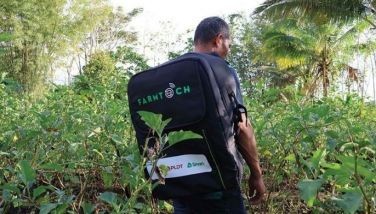GTEB approves $100,000 budget for US lobby group

November 7, 2005 | 12:00am
The Garments and Textile Export Board (GTEB) has approved a $100,000 (roughly around P5.5 million) government support for a US lobby to grant the Philippines a sector specific duty-free tariff agreement for the garments sector.
This was confirmed to The STAR by Trade and Industry Secretary Peter B. Favila after the GTEB Board approved the funding request after a month and a half of careful study.
According to Favila, "we approved the funding to help the garments sector."
However, Favila explained that the initial funding support is based on the understanding that the US lobby group of Sandler Travis & Rosennberg would be able to tell after a three-month period whether or not the Philippines has a chance of securing the FTA.
The Confederation of Garment Exporters of the Philippines (CONGEP) had written the DTI in August seeking a $1.786 million or roughly P100 million government subsidy to cover the total direct lobby work needed to negotiate a preferential sectoral agreement with the US.
The $1.786 million represents the projected 15-month retainer fee of Sandler Travis & Rosenberg of Washington, plus the success fee and a provision for a US congressional lobby budget.
According to CONGEP, the bulk of negotiation to be done in Washington is expected to be heavy on lobby work with members of the US Congress, US National Security Council and the United States Trade Representative (USTR) Office.
The local garments industry, for their part, had pledged to put up the local funding of $100,000 or P5.5 million to cover the required counterpart effort in the Philippines and provide ample provision for the Philippine negotiating team to conduct a local research, data analysis and the private sector counterpart costs during the required negotiating trips to the US.
The lobby firm of Sandler Travis & Rosennberg P.A. have previously secured successful similar FTAs for countries like Australia, Bahrain, Egypt, Jordan, Israel, Singapore and South Africa.
Sandler Travis & Rosenbery are currently working on Thailand’s bid for an FTA.
The CONGEP has been urging the DTI to agree to support the lobby so that work could begin before December.
CONGEP chairman Donald Dee had warned that failure to act immediately within the next six months could marginalize Philippine garments and result in foreign currency losses of up to P1.5 billion.
The CONGEP, along with the Garments Business Association of the Philippines (GBAP), Textile Mills Association of the Philippines (TMAP), Foreign Buyers Association of the Philippines (FOBAP), the Associated Labor Union-Trade Union Congress of the Philippines (ALU-TUCP), National Confederation of Labor (NCL) and Alyansa ng mga Manggagawa sa Garments at Textiles, appealed for speedy action on the request before half of industry’s workforce or 200,000 workers lose their jobs.
The DTI has been slow in responding to the garments and textiles sector’s request because of the recent Venable lobby contract.
Dee, however, clarified that the garments sector request is totally different from the Venable issue because it involves trade negotiations for the garments sector.
He also clarified that the preferential tariff agreement is sector specific and would not involve the more complex and comprehensive free trade agreement.
Dee reiterated that the garments and textile market is very competitive and the Philippines’ failure to respond immediately could result in buyers pulling out their order and giving them to competitors like China and Sri Lanka which are more competitive because of their cheap labor.
This was confirmed to The STAR by Trade and Industry Secretary Peter B. Favila after the GTEB Board approved the funding request after a month and a half of careful study.
According to Favila, "we approved the funding to help the garments sector."
However, Favila explained that the initial funding support is based on the understanding that the US lobby group of Sandler Travis & Rosennberg would be able to tell after a three-month period whether or not the Philippines has a chance of securing the FTA.
The Confederation of Garment Exporters of the Philippines (CONGEP) had written the DTI in August seeking a $1.786 million or roughly P100 million government subsidy to cover the total direct lobby work needed to negotiate a preferential sectoral agreement with the US.
The $1.786 million represents the projected 15-month retainer fee of Sandler Travis & Rosenberg of Washington, plus the success fee and a provision for a US congressional lobby budget.
According to CONGEP, the bulk of negotiation to be done in Washington is expected to be heavy on lobby work with members of the US Congress, US National Security Council and the United States Trade Representative (USTR) Office.
The local garments industry, for their part, had pledged to put up the local funding of $100,000 or P5.5 million to cover the required counterpart effort in the Philippines and provide ample provision for the Philippine negotiating team to conduct a local research, data analysis and the private sector counterpart costs during the required negotiating trips to the US.
The lobby firm of Sandler Travis & Rosennberg P.A. have previously secured successful similar FTAs for countries like Australia, Bahrain, Egypt, Jordan, Israel, Singapore and South Africa.
Sandler Travis & Rosenbery are currently working on Thailand’s bid for an FTA.
The CONGEP has been urging the DTI to agree to support the lobby so that work could begin before December.
CONGEP chairman Donald Dee had warned that failure to act immediately within the next six months could marginalize Philippine garments and result in foreign currency losses of up to P1.5 billion.
The CONGEP, along with the Garments Business Association of the Philippines (GBAP), Textile Mills Association of the Philippines (TMAP), Foreign Buyers Association of the Philippines (FOBAP), the Associated Labor Union-Trade Union Congress of the Philippines (ALU-TUCP), National Confederation of Labor (NCL) and Alyansa ng mga Manggagawa sa Garments at Textiles, appealed for speedy action on the request before half of industry’s workforce or 200,000 workers lose their jobs.
The DTI has been slow in responding to the garments and textiles sector’s request because of the recent Venable lobby contract.
Dee, however, clarified that the garments sector request is totally different from the Venable issue because it involves trade negotiations for the garments sector.
He also clarified that the preferential tariff agreement is sector specific and would not involve the more complex and comprehensive free trade agreement.
Dee reiterated that the garments and textile market is very competitive and the Philippines’ failure to respond immediately could result in buyers pulling out their order and giving them to competitors like China and Sri Lanka which are more competitive because of their cheap labor.
BrandSpace Articles
<
>
- Latest
- Trending
Trending
Latest





























